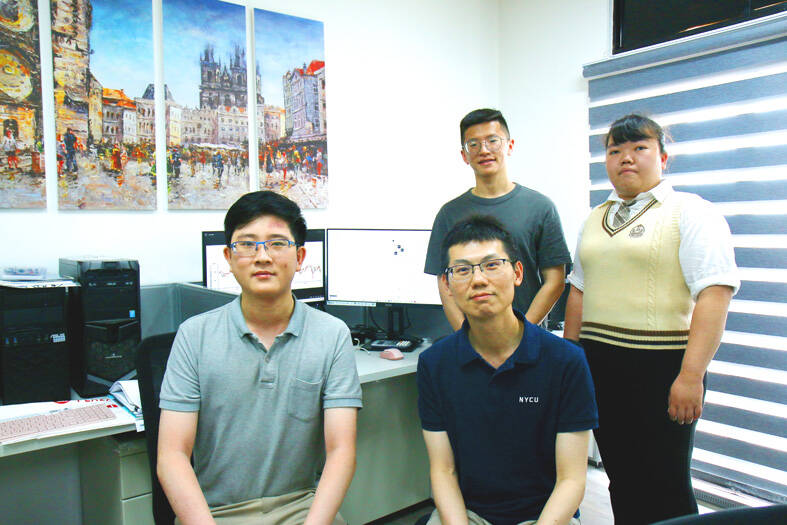A research team from National Yang Ming Chiao Tung University (NYCU) has developed a technology that can significantly improve heat dissipation in multicore processors.
Laptops, mobile phones and computer servers commonly have multicore processors, the university said in a statement.
As the number of cores increases, the challenges of connectivity within the network-on-chip (NoC) also rise, it said.

Photo courtesy of National Yang Ming Chiao Tung University
As the core clock speed increases, so do temperatures, which affect operating performance and reliability, it said.
The research team of members of the NYCU Cerebral and Reliable System on Chip Laboratory led by NYCU electrical engineering associate professor Chen Kun-chi (陳坤志) proposed a more cost-effective mechanism that can accurately predict temperatures in NoCs and apply dynamic temperature management via adaptive reinforcement learning technology, greatly improving the performance of a system’s temperature management, the university said.
The paper, “Adaptive Machine Learning-Based Proactive Thermal Management for NoC Systems,” was published last year in the international journal IEEE Transactions on Very Large Scale Integration Systems, the university said.
The team won the journal’s Best Paper Award, the first Taiwanese to receive the honor in the past 30 years, it said.
The machine-learning temperature management technology adopts least-mean-square adaptive filtering theory optimization, which improves temperature prediction accuracy as a processor undertakes different tasks, Chen said.
It uses an adaptive reinforcement learning method to adjust the throttling ratio via real-time feedback from temperature, predicted temperature and system throughput, with the goal to achieve optimal thermal management while maximizing performance, he said.
The research showed that, compared with traditional methods, the adaptive learning method significantly reduces temperature prediction errors and improves system performance, he said.

POSITIVE DEVELOPMENT: Japan and the US are expected to hold in-depth discussions on Taiwan-related issues during the meeting next month, Japanese sources said The holding of a Japan-US leaders’ meeting ahead of US President Donald Trump’s visit to China is positive news for Taiwan, former Japan-Taiwan Exchange Association representative Hiroyasu Izumi said yesterday. After the Liberal Democratic Party’s landslide victory in Japan’s House of Representatives election, Japanese Prime Minister Sanae Takaichi is scheduled to visit the US next month, where she is to meet with Trump ahead of the US president’s planned visit to China from March 31 to April 2 for a meeting with Chinese President Xi Jinping (習近平). Japan and the US are expected to hold in-depth discussions on Taiwan-related issues during the

‘LIKE-MINDED PARTNER’: Tako van Popta said it would be inappropriate to delay signing the deal with Taiwan because of China, adding he would promote the issue Canadian senators have stressed Taiwan’s importance for international trade and expressed enthusiasm for ensuring the Taiwan-Canada trade cooperation framework agreement is implemented this year. Representative to Canada Harry Tseng (曾厚仁) in an interview with the Central News Agency (CNA) said he was increasingly uneasy about Ottawa’s delays in signing the agreement, especially as Ottawa has warmed toward Beijing. There are “no negotiations left. Not only [is it] initialed, we have three versions of the text ready: English, French and Mandarin,” Tseng said. “That tells you how close we are to the final signature.” Tseng said that he hoped Canadian Prime Minister Mark Carney

President William Lai (賴清德) yesterday bestowed one of Taiwan’s highest honors on Saint Vincent and the Grenadines (SVG) Ambassador Andrea Clare Bowman in recognition of her contributions to bilateral ties. “By conferring the Order of Brilliant Star with Grand Cordon on Ambassador Bowman today, I want to sincerely thank her, on behalf of the Taiwanese people, for her outstanding contribution to deepening diplomatic ties between Taiwan and SVG,” Lai said at a ceremony held at the Presidential Office in Taipei. He noted that Bowman became SVG’s first ambassador to Taiwan in 2019 and

A man walks past elementary school artworks at the Taipei Lantern Festival in Ximen District yesterday, the first day of the event. The festival is to run from 5pm to 10pm through March 15.